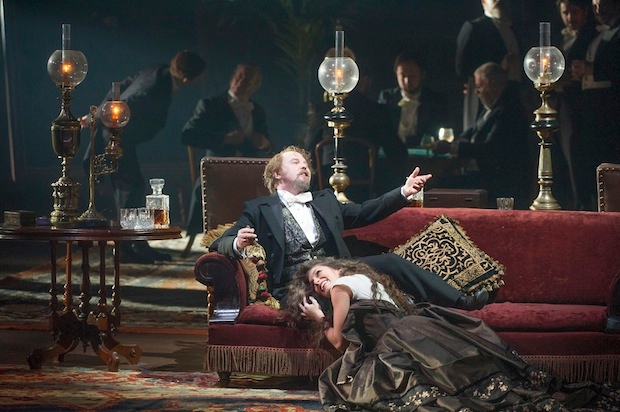So it’s farewell to the fedoras and adieu to the jukebox. After 32 years of service, Jonathan Miller’s Little Italy staging of Rigoletto has been given the heave-ho by English National Opera and replaced by a younger model. First seen and disliked in Chicago in 2000, then seen and disliked again in Toronto, Christopher Alden’s nearly-new production affords the London audience an opportunity to congratulate itself for being less conservative than the North Americans, thereby mitigating its customary fright at the provocations of Continental Regietheater. Potted palms, Turkish carpets, oil lamps and leather armchairs fill the stage in Michael Levine’s handsome reconstruction of a mid-19th-century oak-panelled gentleman’s club, Alden’s analogue for the court of Mantua. Breathe deeply and you can almost smell the macassar oil.
Verdi’s 1851 adaptation of Victor Hugo’s Le roi s’amuse premièred in the age of Great Exhibitions and freak-shows, scientific progress and the sprawling squalor recorded by Henry Mayhew. The rich are always with us in Levine’s unchanging interior, crowding around the Chesterfield to cheer on their debauched Duke or snapping open their newspapers in indifference as the tragedy of a curse on a man already cursed spirals to its bloody conclusion. Rigoletto’s modest residence and the rookery where the assassin Sparafucile and his prostitute sister Maddalena ply their trade have to be imagined.
Tolerated and even feared in high society for his wit and sharp tongue, Verdi’s hunchbacked jester is punished for withholding the sympathy that has been withheld from him. His is an exhausting, painful condition, putting strain on the spine, the legs, the heart. To this is added shame, self-loathing and suffocating love, all knitted into the brow of Quinn Kelsey’s Rigoletto: a magnetic, bruising, eloquent impersonation of this kyphotic antihero, first seen dozing fitfully in an armchair while Monterone’s disgraced daughter (a silent role) lies upstage in a pool of light, an amuse-bouche for the humiliation of Gilda.
Crippled by innocence and ignorance, not permitted to know her father’s name, Gilda (Anna Christy) falls ravenously on the Duke’s alias of Gualtier Maldè, the coloratura of ‘Caro nome’ describing a desperate, quivering, highly strung joy. At last someone has told her something, even if that something is a lie. Barry Banks, singing the role of the Duke purposefully, jumps up on the sofa like a priapic pekinese to lend emphasis to ‘Questo e quella’, ironically donning a breastplate for ‘La donna è mobile’. If I were Giovanna (Diana Montague), I’d give him a sharp tap on the nose and put him back down on the floor. Instead, she glides about the stage, smiling at some secret knowledge, occasionally submitting to a nostalgic grope. Much like Don Giovanni, her patron has catholic tastes. There is little sense of grown-up sensuality in him, more a kind of boredom and ill-focused irritability, the joyless sensation-seeking of an addict. I would hazard a guess that rather than reflecting a deficit of charisma or glamour on Banks’s part, this is intentional. Alden’s point, if I’m correct, is that every character in Rigoletto, from duke to jester, virgin to whore, is who they are as a result of where and to whom they were born. The Duke does what he does because he can. In the case of the women, Justina Gringyte’s sharp-eyed Maddalena enjoys more freedom than Susan Rann’s mortified Countess Ceprano.
Alden’s bravura direction of the chorus and the minor roles is absorbing but his handling of the plot is so stylised as to be distancing. The ladder on which we see Gilda attempt to escape didn’t trouble me. (There is no pretty way to stage an abduction that we infer will lead to a gang rape.) Neither did the fact that David Stout’s Monterone is hanged in the club, and remains there, on the understanding that no member of this establishment will squeal. (The first rule of Fight Club, etc.) But the absence of the sack in which Rigoletto’s poor, stupid angel is discovered dying in place of the rich, stupid devil whose murder he has commissioned is regrettable. Is Peter Rose’s Sparafucile an assassin or simply another jester?
Also problematic is the lack of suspense in the orchestral performance under Graeme Jenkins. You’d have to be half-dead not to respond to the storm, but the prelude to Act III, with its votive cadences, needs similar electricity. Some will accuse Alden of mischief. I think his intention is serious: to illustrate Rigoletto and his Duke within the society that has made them, much like his twin brother David’s reading of Grimes in Peter Grimes. The novice will leave dazzled but confused. Even so, that jukebox joke had less place in Verdi’s world than a corpse in a gentleman’s club.






Comments